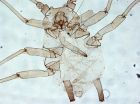(Press-News.org) MADISON — A cold dose of fear lends an edge to the here-and-now — say, when things go bump in the night.
"That edge sounds good. It sounds adaptive. It sounds like perception is enhanced and that it can keep you safe in the face of danger," says Alexander Shackman, a researcher at the University of Wisconsin-Madison.
But it sounds like there's also a catch, one that Shackman and his coauthors — including Richard Davidson, UW-Madison psychology and psychiatry professor — described in the Jan. 19 Journal of Neuroscience.
"It makes us more sensitive to our external surroundings as a way of learning where or what a threat may be, but interferes with our ability to do more complex thinking," Davidson says.
Faced with the possibility of receiving an unpleasant electric shock, the study's subjects showed enhanced activity in brain circuits responsible for taking in visual information, but a muted signal in circuitry responsible for evaluating that information. Remove the threat of shock (and thus the stress and anxiety) and the effect is reversed: less power for vigilance, more power for strategic decision-making.
The shift in electrical activity in the brain, captured by a dense mesh of sensors placed on the scalp, may be the first biological description of a paradox in experimental psychology.
It has long been known that imminent danger can enhance the ability to detect faint stimuli in the environment, such as the crackle of a leaf signaling the approach of a predator. But it is equally clear that the stress and anxiety aroused by a threat can profoundly disrupt the ability to think clearly and perform more complex "executive" tasks.
"In the last few years, theorists have hypothesized that this paradox might reflect several systems working in conjunction: one responsible for the rapid detection of external stimuli, the other responsible for the slower, more reflective evaluation of that incoming information," Shackman says. "Stress upsets the balance of those systems."
In fact, as the senses go into overdrive, they are probably confounding the rest of the brain all the more.
"Your ability to do more complex tasks is disrupted just as the amount of information you're receiving through your eyes and ears is enhanced," Shackman says. "You're having trouble focusing on the information coming in, but your brain is taking in more and more potentially irrelevant information. You can have a viscous feedback loop, a sort of double-whammy effect."
The resulting confusion favors quick, reflexive actions, the "survival instincts" often mentioned by trauma survivors — Noise? RUN! — in a way that was likely adaptive in the dangerous environments in which the ancestors to modern humans evolved.
"In our evolutionary past, the dangers we faced were really survival-threatening," Davidson says. "That's not so much the case now. Because of the nature of our brains, we can use our neural capacity to create our own internal danger. We can worry about the future and ruminate about the past."
Either one is likely to present a real hurdle to effective decision-making under stress.
"This is part of a growing body of evidence showing that stress does have important consequences for the brain, not just something that arouses the body — tension in your muscles or butterflies in the stomach," says Davidson, who studies the effects of meditation as director of UW-Madison's Center for Investigating Healthy minds.
"One of the things we would expect is that if we use an antidote like systematic meditation training to learn to control stress it would not just calm the body, but improve our ability to engage in complex analytical activity," he says.
INFORMATION:
Jeffrey S. Maxwell of the U.S. Army Research Laboratory joined Shackman as lead author of the study, which was funded by the Department of Defense, National Institutes for Health and National Science Foundation.
— Chris Barncard, 608-890-0465, barncard@wisc.edu
CONTACT: Alexander Shackman, 608-358-5025, shackman@wisc.edu; Richard Davidson, 608-262-8972, rjdavids@wisc.edu
END
Collaborative research at the University of Guam has people asking: "What IS a species" and entomologists wondering about the relationship between an insect species and the host plant or plants it feeds on.
Western Pacific Tropical Research Center (WPTRC) entomologist Ross Miller has been studying aphids for years and this work has brought him in contact with entomologists in Canada and the US mainland. Aphid systemetist Robert Foottit, DNA expert Eric Maw and aphid authority Keith Pike have been working with Miller on the identification of aphids, particularly the dreaded ...
While the overall hospitalization rate for stroke has declined in recent years, the numbers have jumped dramatically for patients infected with human immunodeficiency virus (HIV), suggesting they may be up to three times more likely to suffer a stroke than people uninfected by the virus that causes AIDS.
In a paper published in the Jan. 19 online issue of Neurology, Bruce Ovbiagele, MD, professor of neurosciences at the University of California, San Diego School of Medicine and Avindra Nath, MD, of Johns Hopkins University, reviewed a national dataset of all hospital ...
ST. PAUL, Minn. – New research suggests that people infected with human immunodeficiency virus (HIV) may be up to three times more likely to have a stroke compared to those not affected with HIV. The study is published in the January 19, 2011, online issue of Neurology®, the medical journal of the American Academy of Neurology.
"Our findings showed that stroke hospitalizations in the United States decreased by seven percent in the general population within the last decade while stroke hospitalizations for people with HIV rose 67 percent," said Bruce Ovbiagele, MD, MSc, ...
Ohio State University entomologists have conducted the first genetic study of bedbugs, paving the road to the identification of potential genes associated with pesticide resistance and possible new control methods for the troublesome insect, whose sudden resurgence in the United States has led to a public health scare.
The discovery was reported Jan. 19 in the online journal PLoS ONE.
"While bedbugs are poised to become one of the major household pests across the United States in the coming years, we know very little about their genetic makeup and their mechanisms of ...
The secrets behind the mysterious nano-sized electromagnetic "hotspots" that appear on metal surfaces under a light are finally being revealed with the help of a BEAST. Researchers at the U.S. Department of Energy (DOE)'s Lawrence Berkeley National Laboratory (Berkeley Lab) have developed a single molecule imaging technology, dubbed the Brownian Emitter Adsorption Super-resolution Technique (BEAST), that has made it possible for the first time to directly measure the electromagnetic field inside a hotspot. The results hold promise for a number of technologies including ...
UCSF researchers have developed a new approach to decoding the vast information embedded in an organism's genome, while shedding light on exactly how cells interpret their genetic material to create RNA messages and launch new processes in the cell.
By combining biochemical techniques with new, fast DNA-sequencing technology and advanced computer technology, the team was able to examine with unprecedented resolution how a cell converts DNA into RNA – a molecular cousin of DNA that is used in the process of creating proteins that govern most biological functions. And they ...
The Orion Nebula, also known as Messier 42, is one of the most easily recognisable and best-studied celestial objects. It is a huge complex of gas and dust where massive stars are forming and is the closest such region to the Earth. The glowing gas is so bright that it can be seen with the unaided eye and is a fascinating sight through a telescope. Despite its familiarity and closeness there is still much to learn about this stellar nursery. It was only in 2007, for instance, that the nebula was shown to be closer to us than previously thought: 1350 light-years, rather ...
(Toronto, Canada – January 20, 2011) – Cancer scientists led by Dr. John Dick at the Ontario Cancer Institute (OCI) and collaborators at St Jude Children's Research Hospital (Memphis) have found that defective genes and the individual leukemia cells that carry them are organized in a more complex way than previously thought.
The findings, published today in Nature (DOI:10.1038/nature09733), challenge the conventional scientific view that cancer progresses as a linear series of genetic events and that all the cells in a tumour share the same genetic abnormalities and ...
Society has long debated the contrasting advantages of monogamy and promiscuity and, in western society at least, the long term benefits of monogamy have in general won out. However new research published in BioMed Central's open access journal BMC Evolutionary Biology shows that sperm from polygamous mice are better competitors in the race for fertilisation.
Dr Renée Firman at the Centre for Evolutionary Biology, University of Western Australia, has used house mice to show that sperm from rival males compete to fertilise females and that, over several generations, polygamy ...
What makes music beautiful? The best compositions transcend culture and time – but what is the commonality which underscores their appeal? New research published in BioMed Central's open access journal BMC Research Notes suggests that the brain simplifies complex patterns, much in the same way that 'lossless' music compression formats reduce audio files, by removing redundant data and identifying patterns.
There is a long held theory that the subconscious mind can recognise patterns within complex data and that we are hardwired to find simple patterns pleasurable. Dr ...


